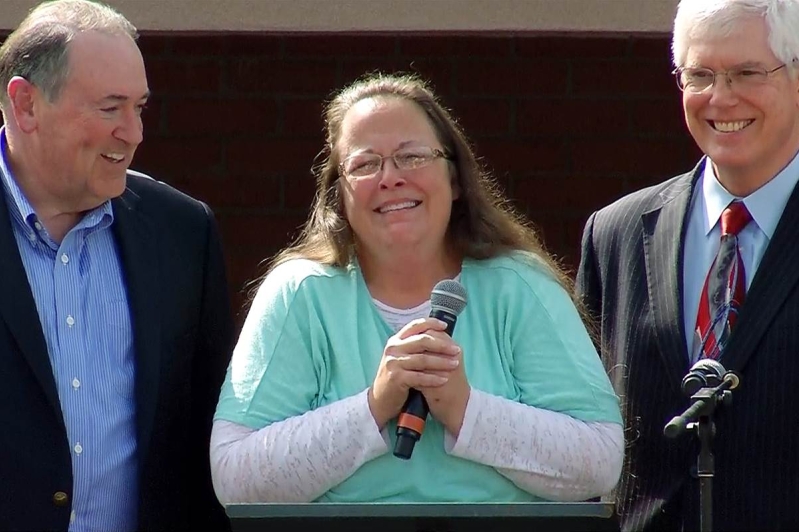
Theologian John Piper has said Kentucky clerk Kim Davis was "morally right and probably legally right" in refusing to issue marriage licenses to same-sex couples in defiance of the U.S. Supreme Court ruling.
Piper, who is the chancellor of Bethlehem College & Seminary, weighed in on the controversial issue during a recent "Ask Pastor John" podcast after numerous people emailed him asking his opinion.
"I don't know Kim Davis's heart, so I can't assess her motives," the Desiring God author began. "And I don't know her theology. It is possible to do right actions for wrong reasons, and so be wrong in doing right. So I will just try to say something about her actions and what appear to be some of her convictions and perhaps touch on some wider implications."
Piper contended that Davis is right in her decision to reject "so-called same sex marriage as contrary to God's design for what marriage is." He also affirmed she is right in "assessing this departure from God's will as massive, not marginal, and as personally and culturally deadly, not trivial. And therefore it's not something that you can just go along with as if that were a loving thing to do."
As reported by the Gospel Herald, Davis was jailed for six days after she defied a judge's order to issue the marriage licenses to same-sex couples. At the time, she explained that the U.S. Supreme Court's ruling on June 26 that legalized gay marriage nationwide conflicts with the vows she made when she became a born-again Christian.
"I promised to love Him with all my heart, mind and soul because I wanted to make heaven my home," Davis told the judge. "God's moral law conflicts with my job duties. You can't be separated from something that's in your heart and in your soul."
Referring to 1 Corinthians 6:9-10, which states that neither the "sexually immoral, nor idolaters, nor adulterers, nor men who practice homosexuality, nor thieves, nor the greedy, nor drunkards, nor revilers, nor swindlers will inherit the kingdom of God", Piper explained that calling same-sex marriage "legal" in no way removes the "capital punishment that will follow in eternity."
"Therefore, this judgment of the Supreme Court is massively evil and deadly for persons," he writes, explaining that in light of this, Davis is "morally right and probably legally right."
"She is morally right because God has given civil authorities to the world to reward the right and punish the evil," the pastor explained, quoting 1 Peter 2:13-14 and Romans 13:1, 3-4. "So when those authorities promote evil and punish good, those authorities may rightly be disobeyed for the sake of obeying God."
Emphasizing that gay marriage is not marriage, Piper writes, "If she blesses with her authority and her signature a union which leads to destruction, she endorses and participates in that destruction. Encouraging homosexual behavior is the participation in someone's destruction. I think she is right not to do that."
As far as whether Davis was legally bound to resign instead of obstructing the licensing process, Piper encourages readers to look at two angles.
"One is to observe that perhaps she is not the one breaking the law, but that that Supreme Court broke the law by their ludicrous claim that they found in the Constitution a right to the non-existent illusion called 'same sex marriage,'" Piper explains. "The other angle that suggests Kim Davis was not only morally right, but, perhaps, legally right, is that she was drawing the line - the hill to die on - not at whether so-called 'gay marriage' could be authorized by anyone in Kentucky, but by whether it would have to be authorized by her. The specific issue was whether her name or her official authority as clerk was put on the licenses."
Piper ended his commentary with a warning that Davis' is "just one prominent case of what will be hundreds in the months and years to come as Christians and others draw a line of conscience beyond which they will not go."
In June, Piper issued a lengthy responded to the Supreme Court's decision to legalize gay marriage, saying it approves and institutionalizes the sin of homosexual intercourse.
"Jesus died so that heterosexual and homosexual sinners might be saved," Piper wrote on his desiringGod blog, adding that this salvation from sinful sexual acts "was not embraced," as the highest court's ruling shows.
"Instead there was massive institutionalization of sin," Piper said.
"Alongside its clearest explanation of the sin of homosexual intercourse (Romans 1:24-27) stands the indictment of the approval and institutionalization of it," he added, explaining that though people know intuitively that homosexual acts - along with gossip, slander, insolence, haughtiness, boasting, faithlessness, heartlessness, ruthlessness - are sin, "they not only do them but give approval to those who practice them." (Romans 1:29-32).
"This is what the highest court in our land did today - knowing these deeds are wrong, 'yet approving those who practice them,'" he wrote.






